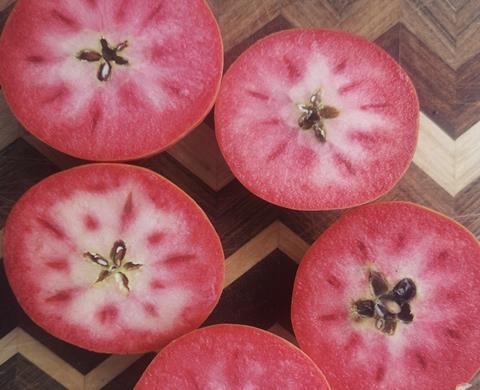Favourable weather conditions produced a high-quality crop, with good sizes and flesh colour
Southern Hemisphere producers of Kissabel apples are reporting a high-quality crop with good sizes and flesh colour thanks to favourable weather conditions.

Harvesting in Chile, Argentina, New Zealand, Australia and South Africa ended in recent weeks with growers reporting very positive results.
In Australia, where the programme is most advanced, Angela Bracken, marketing manager at Montague commented: “we enjoyed a summer that was cooler than usual with above-average rainfall in most growing areas.
“This resulted in high-quality, good-sized fruit. There were a number of issues to deal with due to the humidity, but the result was certainly positive.”
Bracken said the company had conducted trial sales of Kissabel to the local community through its recently opened retail shop, Bill’s Orchard Gate, and gathered feedback on its visual appeal, taste and flavour.
“We have received very good feedback on all fronts, with several consumers returning to buy and asking for more information,” she said.
Montague has also included Kissabel apples in its orchard tours for consumers, during which the company teaches them how to harvest the apple and savour it at its best.
Montague has implemented various marketing activities to promote consumption of its range of pink and red-flesh apples.
These include in-store posters (also used in gift boxes distributed to customers and the media), consumer education sessions, in-store tastings, PR activities with the media and social media posts.
In New Zealand, the Kissabel project is also evolving. “We are now in our third year of testing,” said Paul Paynter, general manager of Yummyfruit, “and we can report that these low-acid apples are exactly what we need.
“This quality is particularly sought after by Asian consumers, whom we are increasingly targeting commercially.”
Another key production area is South Africa, where the advanced testing phase is moving producers towards the “red” varietal group, which is best suited to this area’s soil and climate characteristics.
“We will focus on red-flesh varieties, launching the commercial campaign in 2025 and concentrating on local distribution in premium supermarkets as our main target,” commented Tanith Freeman, product development manager at Dutoit.
Tests underway in Chile by Unifrutti and Argentina by Mono Azul are also achieving strong results. “The flesh colour and crunchiness of Kissabel have been very good,” said Riccardo Gatti, Unifrutti’s head of production.
“The feedback from those who had the opportunity to taste them was exceptional, so much so that the limited available stock quickly sold out.
“This year we will focus on testing in Central America and we are very optimistic about the next marketing steps.”
Programme manager Emmanuel de Lapparent confirmed the positive outlook, commenting: “It is fantastic to see that the Ifored programme is also making great progress in the Southern Hemisphere, with our partners now planning their first pilot plantations.
“Very soon they will have more fruit to assess the market potential of these unique fruit and promote the Kissabel brand”.



